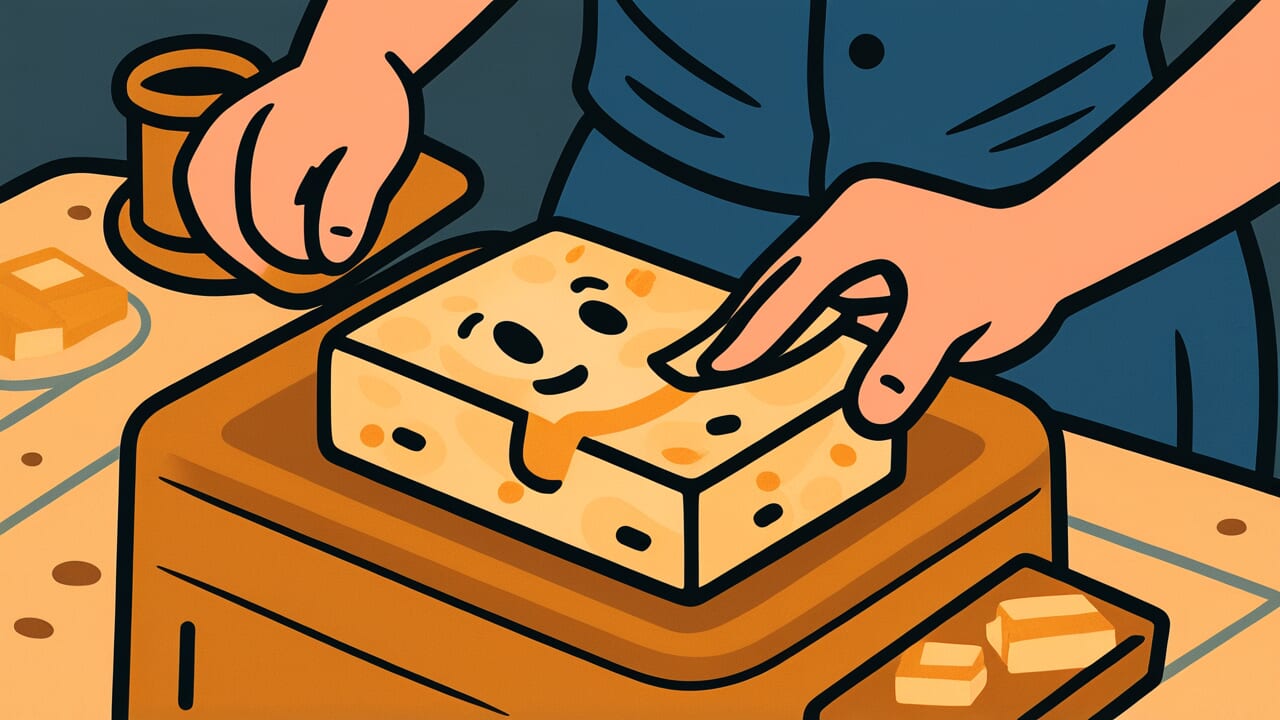How to Read “Peeling the skin of tofu”
Tōfu no kawa wo muku
Meaning of “Peeling the skin of tofu”
“Peeling the skin of tofu” is a proverb that describes the pointlessness of obsessing over trivial details. Tofu has no skin to peel in the first place.
The absurdity of trying to peel something that doesn’t exist warns us against wasting time and energy on unimportant matters.
This proverb is used for people who lose sight of what really matters and get caught up in insignificant details. For example, it applies when someone points out trivial flaws while ignoring major problems.
It also describes people who get absorbed in meaningless tasks while pursuing perfection. Even in modern society, where efficiency and results matter, this expression warns against wasting time on non-essential work.
Origin and Etymology
No clear written records explain the origin of this proverb. However, it likely emerged from the unique characteristics of tofu as a food.
Tofu is a soft food made from soybeans. It has been essential to common people’s meals in Japan since ancient times.
The production method came from China and took root in Japan between the Nara and Heian periods. Tofu contains a lot of water and is extremely soft. It has nothing that could be called skin on its surface.
This proverb expresses the absurdity of trying to peel this “non-existent skin.” Sometimes a thin membrane appears on tofu’s surface.
But trying to carefully peel it off only makes the tofu crumble. It accomplishes nothing. In fact, spending time and effort on such a task is itself wasteful.
During the Edo period, common people handled tofu in their daily lives regularly. In this everyday context, someone might have seen another person worrying about tofu’s surface and doing useless work.
This observation likely gave birth to the proverb as a lesson: “There’s no point worrying about such small things.”
Interesting Facts
Tofu represents “mild flavor” in Japanese cuisine. However, the texture differs greatly between firm tofu and silken tofu depending on the production method.
Firm tofu is filtered through cloth to remove water, leaving cloth marks on the surface. Silken tofu is solidified without filtering, making it smooth.
Either way, there is no “skin to peel.” But this difference in texture symbolizes the delicate food culture of Japanese people.
Tofu is made from soybeans, called “meat from the field,” and is highly nutritious with quality protein. During the Edo period, a cookbook called “One Hundred Tofu Recipes” was published.
This shows how many variations of tofu dishes existed. Perhaps this proverb was born precisely because tofu was such a familiar ingredient on common people’s tables.
Usage Examples
- That person does work like peeling the skin of tofu, and the important things aren’t progressing at all
- We should enrich the content rather than fix minor typos—let’s stop peeling the skin of tofu
Universal Wisdom
The proverb “Peeling the skin of tofu” brilliantly captures a fundamental human weakness. That weakness is the difficulty of facing what truly matters.
Why do people obsess over meaningless details? Actually, a deep psychology hides behind this behavior.
Tackling essential problems is often difficult and carries the risk of failure. Meanwhile, trivial tasks provide easy satisfaction and won’t hurt us even if we fail.
In other words, acts like peeling the skin of tofu are unconscious defense mechanisms for escaping real challenges.
Also, anxiety disguised as perfectionism drives people toward minor details. Even when overall results are sufficient, small flaws become unbearable.
This may express fear of criticism or the desire to prove one’s worth.
This proverb has been passed down through generations because people in every era have struggled with the difficulty of seeing what’s essential.
Judging what is important and what is not—that judgment itself is life’s wisdom. Our ancestors gently teach us this through the familiar metaphor of “tofu skin.”
When AI Hears This
Tofu is already sufficiently soft and homogeneous. Attempting to “peel the skin” from this state causes the tofu to crumble and lose its form.
In other words, adding unnecessary operations to an already stable low-entropy state actually increases disorder. This is the essence of the second law of thermodynamics.
The energy balance of this action is fascinating. A person trying to peel tofu skin invests enormous energy: kinetic energy from hand movements, glucose consumption in the brain from concentration, and cortisol secretion from stress when failing.
But the result is zero or even negative—only a high-entropy state of crumbled tofu remains. All invested energy converts to heat or disorder, and the overall randomness of the system definitely increases.
This pattern appears frequently in modern society. For example, the act of repeatedly revising documents to achieve perfection.
Research shows that document quality reaches 80 percent of its potential in the first 80 percent of time. Then 80 percent of time is spent improving the remaining 20 percent of quality.
This excessive effort increases entropy in the form of team fatigue, missed deadlines, and negative effects on other projects. The laws of the universe return a cold answer to meaningless perfectionism.
Lessons for Today
This proverb teaches modern people the importance of “selection and concentration.” In today’s information-overloaded society, it feels like there are infinite things to do.
We might be spending time like peeling the skin of tofu without realizing it. We worry about small reactions on social media or spend hours making perfect documents.
What matters is stopping to ask ourselves questions. “Is this really necessary?” “How much does this task contribute to the overall goal?”
Aiming for perfection is wonderful. But if perfectionism makes us lose sight of the purpose itself, we’re putting the cart before the horse.
Your time and energy are limited. That’s why you need the courage to focus on what truly has value.
When small things bother you, remember this proverb. Tofu has no skin. And more important things are waiting for you than such trivial matters.



Comments